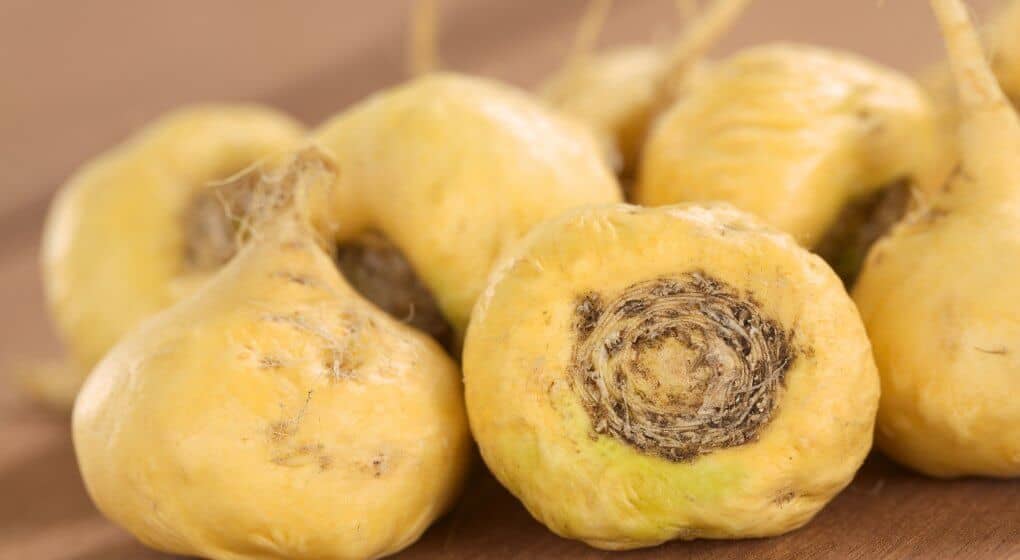
In an ironic twist it would seem one of the newest waves of beneficial health supplements to reach our shores is also one of the oldest. We are referring to that seemingly miraculous Andean grown plant known as Maca Root or Maca
(mock-uh).
This medicinal herb with the botanical name Lepidium meyenii, has been a food source and medicinal staple of the Andean people for thousands of years. Maca is cultivated primarily in the central highlands of Peru but also grows wild in Bolivia, Argentina and Paraguay.
By Any Other Name
Maca is known by many names to include Peruvian ginseng, Pepper-weed, and Maca Maca, as well as Maino and Ayak chichira and others. And though maca is called Peruvian ginseng, it is actually a member of the mustard family and related to the radish and common water cress.
Deep Roots in History
Maca was first domesticated for cultivation by the Andean people some 1,300 to 2,000 years ago so it is hardly a new discovery. In fact, archaeological sites have discovered cultivars of maca dating as far back as 1600 B.C.. In a hostile growing environment some 8,000 to 14,000 feet above sea level, maca has proven to be an extremely hardy plant and a godsend to the indigenous peoples of Peru from an economical standpoint in addition to being both nutritional while possessing a host of medicinal properties.
Few plants could scarce survive the extreme elevations and frigid temperatures let alone the high winds and rocky soil of those rugged mountains but the maca plant thrives, providing a nutritional meal in a hostile environment. To prepare it, the harvested root of the maca is placed out in the sun for five to seven days to dry. Once ready, the maca root can be eaten raw or cooked.
In the West we add it to drinks or sprinkle it on our cereal or other foods. Another benefit of this miraculous little herb is that maca has the shelf-life of gravel. When dried, it can be stored away and remain edible for years. The root is easily reconstituted by simply boiling in water until softened.
Types of Maca
The four main cultivars of maca are red, black, purple and cream. Though varying in color, there is no evidence that supports one color of herb being any more effective than the other. Maca is also a tuber. That is to say it has a tuberous hypocotyl, or tube-shaped root which resembles a radish but is somewhat larger.
This root pulls double duty serving as both food and an herbal remedy. The flavor is somewhat tangy (some say sweet) with an aroma that carries overtones of butterscotch.
Growing low to the ground with smallish, soft white flowers, maca is a perennial herb which means it comes back every year. Annuals are good for only one year then die off.
Maca is a self-fertilizing plant and propagates by seeding. As a tuber, it is not a fast growing plant. In fact, for the root to reach harvestable maturity typically takes between seven to nine months.
Maca the Amazing Little Herb
Many herbs and natural plants offer some health benefits to the user with little or no adverse side effects and maca is no exception. Although little serious study has been done in the way of adverse effects, that is in part due to the fact there have been so few reported side effects that such studies were hardly warranted. But there are some concerns that we'll get to a bit later in this article.
What is Maca Used For?
This multi-beneficial herbal supplement comes with a wish list of perks that leaves much of the competition in the dirt. For centuries maca has been a source of rich nutrition for the Andean people and used successfully as an aphrodisiac and to boost sexual performance. Maca is also used to enhance fertility. Studies have shown that maca does in fact help increase fertility.
In other medicinal areas it is well documented the native people have used maca to treat any number of maladies, disorders and diseases. Ethnobotanical studies have verified that maca has been used as treatment for tuberculosis, fatigue, depression, and stress and even cancer.
What's Makes Maca So Effective?
It's easy to see what makes maca such a nutritional super-food once you realize its composition. Maca hosts a boatload of vitamins such as B1, B12, C and E along with enzymes and minerals. Additionally, it is high in calcium and contains nearly 20 amino acids and some antioxidants along with other goodies.
Moreover, studies support findings that maca is one of the most effective natural remedies helping regulate and support endocrine (en-dekrin) health. Endocrine refers to the system of secreting glands such as the pineal, thyroid gland and others. The effects of hormones on health and body weight specifically are well known. This is the idea underlying the popular HCG diet. Depending on the variety of maca grown and soil conditions, maca is approximately 12% to 14% protein.
What are the Overall Benefits of Maca?
As with anything in life, not everyone is on board with all the claims made by devoted maca fans and users but there is substantial evidence supporting much of what is said. Especially when the enthnobotanical Peruvian archives are perused. Another thing to consider is...if it didn't work, it would have faded into history like so many other snake oil herbs.
However, the opposite holds true. Not only is maca still being used with great efficacy, it is gaining in popularity as more people discover its remarkable capabilities.
Weight Loss
One area people want to know about is maca and weight loss. While taking maca does not directly curb your appetite or melt away pounds, it does hike your energy level giving you more stamina to be able to walk, workout, or exercise longer which could contribute to losing weight.
So indirectly helping one to lose weight would be a more accurate statement. The most common forms of ingestion are powder and capsules.
The health gains are numerous. Many people report positive results in their health after taking maca. It generally takes a week or so before you begin realizing some of the benefits.
Health Benefits
Here is a very brief list of reported benefits associated with taking maca. Please keep in mind some of these claims are yet to be proven by hard science but some have been. This list does however reflect the human experience.
- An increase in fertility
- Enhanced libido
- Improved sex drive
- Menstrual cramps and hot flashes relief
- Increased mental and physical energy
- Balances out and regulates hormones
- Benefits the endocrine system
- The Andean people have long used maca successfully for stress relief and studies support this claim
This wonderful super-supplement is brimming with all manner of good things for the body and mind from its multiple vitamins to its plentiful proteins, amino acids and precious minerals. All this while offering excellent nutritional value. As to the recommended dosage, do your homework.
Do some research of your own. As with any herbal supplement, it is generally best to introduce it into your system gradually. Start with a smaller milligram dosage and see how you feel after a week. Increase as you deem necessary.
A Word of Caution!
People suffering with thyroid conditions, certain cancers, high blood pressure and other health issues should ALWAYS consult a health care professional or personal physician BEFORE taking maca or any herbal supplement because they do have an effect on the body and under certain conditions, can be be negative. So check with a doctor first.
Please let us know your experience with maca by sharing your story with us and our readers here at the Organic Daily Post website.
